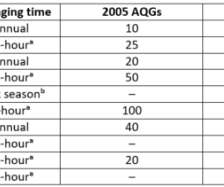WHO issues new, lower Global Air Quality Guidelines for classical pollutants
Green Car Congress
SEPTEMBER 25, 2021
New WHO has issued new Global Air Quality Guidelines (AQGs) that reduce levels of key air pollutants, some of which also contribute to climate change. When action is taken on these classical pollutants—particulate matter (PM), ozone (O?), and PM 10 ), ozone, nitrogen dioxide, sulfur dioxide and carbon monoxide.












Let's personalize your content